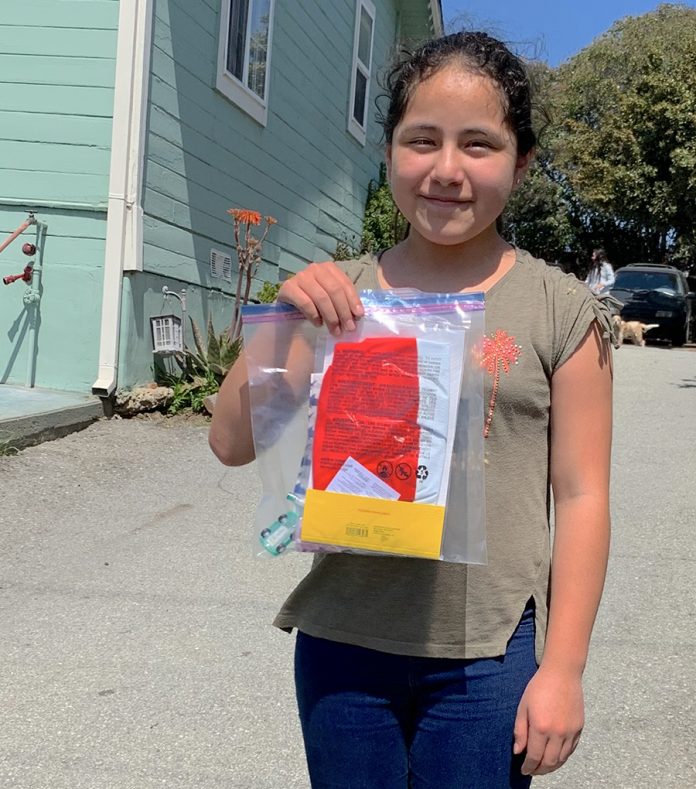
SANTA CRUZ COUNTY—When Calabasas Elementary School fourth-grader Rosinely Resendez isn’t doing schoolwork in her tiny house in Watsonville, or independently teaching herself algebra online through Khan Academy, she is helping her mother care for her three siblings, including a 2-month-old sister.
Rosi, as her friends call her, is among scores of young people who are doing their lessons via “distance learning” after elected officials closed nearly all schools nationwide in an attempt to battle the novel coronavirus pandemic.
In addition to her siblings and parents, Rosi lives with an uncle and his 2-year-old daughter. She said the bustle in her home makes it difficult to study, and she often suffers from boredom.
“I mostly feel kind of sad because at school I learn a lot,” she said. “And when I’m not at school and I’m at my house I feel so stressed that I don’t know what to do.”
Her teacher says Rosi is a rare student in that she completes all of her assigned work.
But many students are grappling with doing their schoolwork, which requires internet access—and a device to access the lessons—all while being stuck at home.
The drastic shift away from the reliable routine of school has been a difficult transition, said Pajaro Valley Unified School District socio-emotional counselor Julia Reynolds.
“There are a lot of students who express academic stress,” she said. “Learning from a computer is very difficult in comparison with learning from a teacher, and being able to ask her questions or hear something explained in multiple ways.”
The students’ stress is often compounded, Reynolds said, by seeing the adults in their lives also dealing with the changes wrought by Covid-19.
“I think there is a global anxiety and stress that everyone is tapped into right now, and obviously the kids pick up on that,” she said. “It’s also not having their support system of friends and teachers and familiar faces every day. It’s isolating for any kid or preteen or teenager to not have their peer group.”
One difficulty for counselors is offering confidentiality to students living in close quarters with their large families as they connect via conference apps such as Zoom, Reynolds said.
Many are opting for text or email correspondence, she said.
Perhaps the most challenging aspect for young people was the abrupt and unexpected change brought on by the closures, coupled with the ones that were already coming, Reynolds said.
“A lot of students, especially eighth-graders, are feeling anxiety about moving on to high school next year,” she said. “Some are going to different schools than their peers, and they kind of all left without realizing that was going to be it for the school year.”
Reynolds’ advice for anyone is to know that stress—and whatever other emotions crop up during the quarantine—are normal emotions.
“If you’re feeling stress, that’s OK,” she said. “If you’re feeling overwhelmed, that’s OK.
Instead of ignoring these emotions, Reynolds suggested finding a way to help find relief from them.
“…whether it’s spending time with your family or drawing or listening to music or getting exercise, cooking. Whatever it might be, just allowing yourself the time to do those things to take care of yourself,” she said.
The Santa Cruz County Office of Education released a list of recommendations and services to help parents weather the pandemic. That is available at santacruzcoe.org.
Roscelia Madrigal, Behavioral Health Director of Pajaro Valley Prevention and Student Assistance (PVPSA), said her organization has seen a huge increase in student and parent referrals, all families struggling under the stay-at-home order.
Parents, many out of work because of the epidemic and facing their own troubles, are calling to ask advice after becoming de facto teachers.
“A lot of what we hear is, ‘we just don’t know what to do right now,’” she said. “They feel like they should be able to know how to handle being a teacher and a parent, and that’s a lot of stress to put on anybody.”
Madrigal said that one of the best ways parents can help their families cope with the stress of home learning is to set a schedule, and stick with it, from bedtime to waking up to meals to homework.
“Kids do their best when they know what’s coming,” she said. “It helps them and it helps the parent.”
She also said that both parents and kids should find alone time for themselves.
Parents should also not be afraid to reach out for assistance, Madrigal said, adding that PVPSA and organizations throughout the county are available to help.
“For us as a community, and here at PVPSA, it is really important to have the family operate as a unit, and parents taking the lead in creating the routine and schedule, and knowing that there’s resources out there and that they can ask for help,” she said. “They are not alone in this and they shouldn’t feel like that.”
Cesar Chavez Middle School students Ariana Jimenez, 12, Eri Estrada, 12, and Tonalli Meza, 11, all say they miss seeing their friends as they navigate their way through an entirely new way of attending school.
Ariana said she stays in touch with her friends largely through email.
“Even though I have a lot of family, I don’t like not being able to see my friends,” she said.
She said her workload is doable, except for one class.
“When it comes to math it’s hard because I don’t have a teacher to guide me,” she said.
Eri said that being with his family all day can be stressful, and has caused “a lot of arguments.”
Still, he has found a way to complete his work and says he enjoys the opportunity to take more “freedom breaks” when he chooses to do so.
Tonalli said she enjoys dancing, making videos and growing tomatoes, chilies and onions in her garden, all of which she said help lessen the stress of working from home.
Watsonville High School senior Omar Casillas said he has adapted to the home-based routine after the initial shock of having the rest of his final year canceled.
“Going from that to not seeing each other at all has been tough for us,” he said.
But the loss of senior-year rituals such as prom, grad night and graduation have been bitter pills to swallow, he said.
“I am going to be the first one in my family to ever graduate from high school,” he said. “That was something I was very much looking forward to, not just for me but for my parents.”
Casillas will be attending UC Los Angeles in the fall, where he will study biology. He is now waiting to hear from university officials about whether his first year of college will also be done via distance learning.
WHS sophomore German Gonzalez said he is trying to keep his spirits up, but admits that can be hard.
“I really do enjoy going to school,” he said. “I like the teachers, I like being there with people I like.”
Gonzalez was part of the track and cross-country teams and several extracurricular activities, all of which vanished when schools closed for the rest of the year.
“They are gone now, and I am not even sure at this point if they are going to be coming back by the fall,” he said.
In addition, he saw the cancellation of two academic summer study programs at UC Santa Cruz.
Gonzalez said he relieves the stress and buoys his spirits by frequent chats with his friends via FaceTime.
Still, the shattered routine has been difficult to reassemble, he said.
“I have this feeling that there’s something that I’ve lost and I can’t get it back besides trying to make the best of the situation,” he said.
Gonzalez asked to include in this story this message for his friends and fellow students.
“I miss being at school, I miss seeing all of you, especially the sophomores I am in class with,” he said. “Eventually this is going to pass and I can’t wait to go back to school with all of you.”












